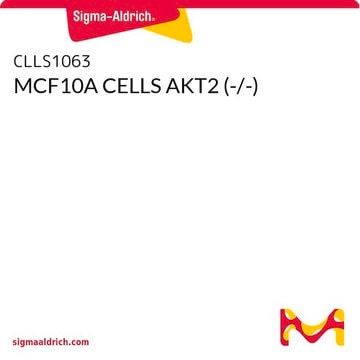CLLS1042
MCF10A CELLS CDH1 (-/-)
human female maMilliporeary glands (Source Disease: Fibrocystic Disease)
Iniciar sesiónpara Ver la Fijación de precios por contrato y de la organización
About This Item
UNSPSC Code:
41106514
eCl@ss:
32190102
NACRES:
NA.81
Productos recomendados
product name
MCF10A CELLS CDH1 (-/-),
biological source
human female mammary glands (Source Disease: Fibrocystic Disease)
OMIM accession no.
storage temp.
−196°C
Gene Information
human ... CDH1(1105)
General description
MCF10A CELLS CDH1 (-/-) are pre-neoplastic mammary epithelial cells from a human adult female with a ZFN knock out modification.
This cell line corresponds to ATCC Catalog No. CRL-10317.
Application
Cell freezing medium-DMSO 1X, Cat. No. C6164
Media renewal changes two to three times per week.
Rapidly thaw vial by gentle agitation in 37°C water bath (~2 minutes), keeping vial cap out of the water. Decontaminate with 70% ethanol, add 9 mL culture media and centrifuge 125 x g (5-7 minutes). Resuspend in complete culture media and incubate at 37°
The base medium for this cell line is Dulbecco′s Modified Eagle′s Medium/Ham′s Nutrient Mixture F-12, Cat. No. 51448C. To make the complete growth medium, add the following components to the base medium: horse serum, Cat No. H1270, to a final concentration (v/v) of 5%; cholera toxin, Cat No. C8052, to a final concentration of 1 ng/mL; human insulin, Cat No. I9278, to a final concentration of 10 ug/mL; epidermal growth factor, Cat No. E9644, to a final concentration of 10 ng/mL; and hydrocortisone, Cat No. H6909, to a final concentration of 0.5 ug/mL.
Features and Benefits
These MCF10A cells are adherent with a doubling time of approx. 48 hours
Zinc finger nuclease (ZFN) knockout on chromosome 16q22.1
Quality
Tested for Mycoplasma, sterility, post-freeze viability, short terminal repeat (STR) analysis for cell line identification, cytochrome oxidase I (COI) analysis for cell line species confirmation.
Disclaimer
RESEARCH USE ONLY. This product is regulated in France when intended to be used for scientific purposes, including for import and export activities (Article L 1211-1 paragraph 2 of the Public Health Code). The purchaser (i.e. enduser) is required to obtain an import authorization from the France Ministry of Research referred in the Article L1245-5-1 II. of Public Health Code. By ordering this product, you are confirming that you have obtained the proper import authorization.
Solo componentes del kit
Referencia del producto
Descripción
- MCF10A CELLS CDH1 (-/-) 1 vial
Storage Class
10 - Combustible liquids
wgk_germany
WGK 3
flash_point_f
Not applicable
flash_point_c
Not applicable
Certificados de análisis (COA)
Busque Certificados de análisis (COA) introduciendo el número de lote del producto. Los números de lote se encuentran en la etiqueta del producto después de las palabras «Lot» o «Batch»
¿Ya tiene este producto?
Encuentre la documentación para los productos que ha comprado recientemente en la Biblioteca de documentos.
Augustine Chen et al.
BMC cancer, 14, 552-552 (2014-08-01)
E-cadherin is an adherens junction protein that forms homophilic intercellular contacts in epithelial cells while also interacting with the intracellular cytoskeletal networks. It has roles including establishment and maintenance of cell polarity, differentiation, migration and signalling in cell proliferation pathways.
Henry Beetham et al.
Scientific reports, 9(1), 12511-12511 (2019-08-31)
The cell-cell adhesion protein E-cadherin (CDH1) is a tumor suppressor that is required to maintain cell adhesion, cell polarity and cell survival signalling. Somatic mutations in CDH1 are common in diffuse gastric cancer (DGC) and lobular breast cancer (LBC). In
Tom Brew et al.
Cancers, 14(1) (2022-01-12)
Germline inactivating variants of CDH1 are causative of hereditary diffuse gastric cancer (HDGC), a cancer syndrome characterized by an increased risk of both diffuse gastric cancer and lobular breast cancer. Because loss of function mutations are difficult to target therapeutically
Nicola Bougen-Zhukov et al.
Cancers, 14(7) (2022-04-13)
The CDH1 gene, encoding the cell adhesion protein E-cadherin, is one of the most frequently mutated genes in gastric cancer and inactivating germline CDH1 mutations are responsible for the cancer syndrome hereditary diffuse gastric cancer (HDGC). CDH1-deficient gastric cancers exhibit
Lyvianne Decourtye-Espiard et al.
Cancers, 14(1) (2022-01-12)
Inactivating germline mutations in the CDH1 gene (encoding the E-cadherin protein) are the genetic hallmark of hereditary diffuse gastric cancer (HDGC), and somatic CDH1 mutations are an early event in the development of sporadic diffuse gastric cancer (DGC) and lobular
Nuestro equipo de científicos tiene experiencia en todas las áreas de investigación: Ciencias de la vida, Ciencia de los materiales, Síntesis química, Cromatografía, Analítica y muchas otras.
Póngase en contacto con el Servicio técnico








